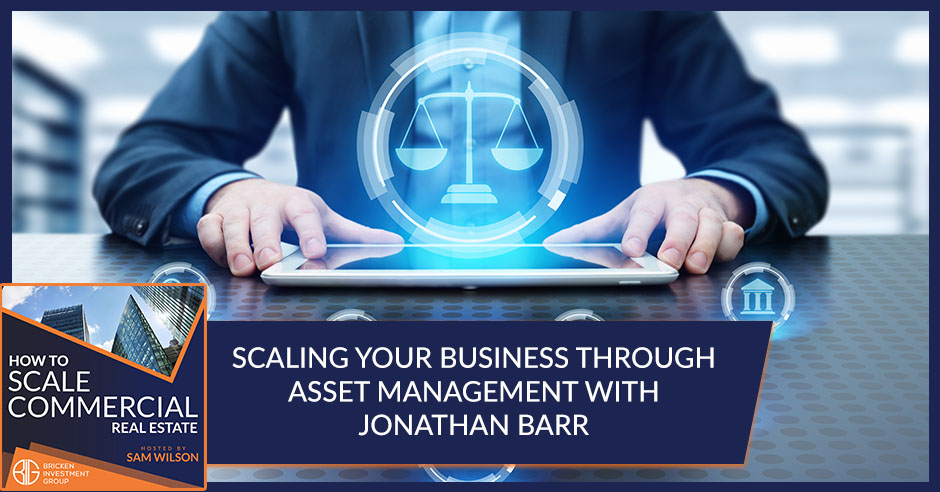There are a lot of factors that go into scaling or growing your business. Learn how to take your time to find the right deals. You can also look at asset management and really start to build that team camaraderie. To learn more about scaling, join your host Sam Wilson and his guest Jonathan Barr. Jonathan is a multifamily syndicator and the Principal at JB2 Investments. Learn how to manage your cash flow and scale properly. Also, discover what the future is for multifamily today.
—
Watch the episode here:
Listen to the podcast here:
Scaling Your Business Through Asset Management With Jonathan Barr
Jonathan Barr started his real estate career after the 2008 recession. He has been involved in over 400 residential flips in the competitive LA market. He has also been in ground-up development and repossessions and is 100% focused on multifamily properties. Jonathan, welcome to the show.
Thanks for having me.
The pleasure is mine. I ask the same three questions every guest who comes on the show. Can you quickly tell us where you started, where you are now, and how you got there?
I grew up in a real estate family, so I’ve always been around it. My daycare was my mom’s office. I went to open houses as a kid. After that 2008 recession, I joined the family business, which was a flip business. We started going to foreclosure auctions. I was in charge of that. We were buying about 7 to 8 homes at one point in Los Angeles a month. We were buying quite a bit. When that started to dry up a bit, we started getting into some ground-up stuff so we did some stuff near downtown Los Angeles. We also had a small portfolio of smaller 1 to 4-unit properties that we held on to. At least I managed myself, so I’ve been in the trenches dealing with tenants and rent control in LA.
I bought a few duplexes in 2010, 2011 and 2012 that appreciated about 400% over that 10-year period ended up selling one of those and buying a building in Kansas City and quadruple my cashflow. I was like, “I needed to do more of that.” Since then, we’ve bought a couple more buildings in Oklahoma City. We have a third one in Oklahoma City under contract, 118 units. About half of the money has come from us. The other half, we have been raising from other people and we’re keeping it going and doing a few deals a year.
To do 400 residential flips, that’s a lot.
It was insane and fun. There were a lot of good deals back then, especially looking back. If we would’ve held onto a quarter of them, I wouldn’t have to lift a finger now.
That’s salt in the wound, but you don’t know what you don’t know. That was how I cut my teeth by buying at the foreclosure auctions. I haven’t had many people come on that have known what happened in those markets. Can you tell us why the deal flow dried up and what happened?
There wasn’t for closures anymore, REOs, short sales, the auctions and because there was less at the auctions, they started getting bid up a lot more than they did before. There were more bidders, competition and the flip shows. We were still doing it, but we were doing less deals. What we ended up doing now that we were doing less deals, we were going into more niched areas and doing higher design and making more profit per deal to make up for that.
Make more per deal. That’s interesting. One of the things that we saw happen was hedge funds came to town. I remember bidding at an auction and there were paying $0.98 on the after repair value at an auction for a property.

Scaling Your Business: You could make a pretty good living in cash flow and buying cash-producing properties. You may not be able to retire off one property but add a handful of those and you’ll make a lot.
They’re trying to park money and make fees.
Park for money for a house they’d never seen the inside of. I’m like, “This house might be worth $200,000 and you gave $196,000 for it and you still got to remodel it and you’ve never seen the inside.
As foundation issues and you’re going to have a big loss.
I’m like, “I can’t compete with this.” That’s when I hung up the cleats at the auctions. I was like, “I’m done.” That’s fascinating. You told us why. You said, “I sold a duplex and I bought a building. I made four times the cashflow. There is got to be more to that.” Was that the pivotal moment when you said, “Let’s shift strategy?”
That’s the catalyst of it, but it happened before then because I bought that duplex that I lived in myself that appreciated a ton and I was able to live for free. I saw the power of income-producing property, long-term holding and what that could be like instead of flipping every 3 to 6 months.
That’s a tough habit to get off of the big wins.
The hit is good.
Once you do that once, it is addictive. It’s like, “We can keep doing that.” Talk to us about the cashflow and maybe how your mindset has shifted more towards cashflow from getting cash in chunks.
The thing about cashflow and buying cash-producing properties is, maybe one property you’re not going to retire off of, but after 10, 15, 20 of them, it adds up. Maybe you’re making $2,000 a month per property, but if you have a handful of those that could easily end up being $20,000, $30,000, $40,000 or $50,000 a month and that’s a pretty good living.
What have been some strategies you guys have used to scale, especially buying out of state and a long way out of state at that?
When you’re doing fewer deals, you can start going into more niche areas and do higher design.
We are doing a lot of the stuff that we were doing before on the flip business like having good broker contacts and good follow-up, doing some owner outreach, talking to our neighbors and other business leaders in the community. Now that we’ve had a few deals in Oklahoma City, we’re getting to know attorneys and different people that have some sway in the city. What’s a cool thing about Oklahoma City is that it’s big enough to have enough product and inventory to do business, but it’s not so big that everyone knows each other and everyone that’s doing something knows each other. You can make a couple of phone calls and move the needle if you need to.
It’s a tertiary market, so you get that hometown feel to it. It’s big enough to where there is enough room for people to play in the sandbox and make money.
People are friendly and they want to help you. They want people to bring money there.
Was it Tulsa that was running the move to Tulsa and you got $10,000?
Remote jobs.
It was like, “You move here and we’ll pay you $10,000 for remote workers.” I was like, “This is crazy.”
I talked to someone that took advantage of that.
It wasn’t just hearsay. I remember reading about it.
It’s the real thing. It’s still going, too. If you move to Tulsa to work there remotely, you could potentially get $10,000.
Talk to us about growing your business. I know you said you’ve made the contacts there on the ground, but what were some challenges you guys have faced in scaling your multifamily holdings there?

Scaling Your Business: The Oklahoma City market is big enough to have enough product and inventory to do business. But it’s not so big that everyone knows each other and is doing business with each other.
Finding good deals. The market’s pretty crazy. You got to look at 50, sometimes 100 deals before you can find one that makes sense. The other thing that’s made us successful is now that we have a few properties, we know intimately how we could push rents and what expenses look like, where we can cut, do we need this much staffing? Can we share a maintenance guy with the other property that our managers managing down the street? Different nuances like, “What’s the difference between the ‘70s and ‘80s build and insurance costs? That’s significant, especially in Oklahoma. Little things like that can make a substantial difference. A $20,000 difference in insurance premiums goes a long way.
That’s not something that I would’ve thought about right out of the gate. Those are small things that add up. Talk to us about some things you guys feel you’ve done right as you have scaled that other people should emulate.
People don’t focus enough on asset management. That’s where we’ve done well in operations. Budgeting, make sure to review monthly budgets, having weekly calls with our property manager and KPI reporting. Working as a team with our manager, I don’t feel like they work for us. I feel like we’re doing it together. We assist them and they assist us. They give us the information we need. They’re our eyes and ears, but it’s a team. It’s not they work for us. They do ultimately work for us.
Are you guys self-managing or do you have third-party property management?
We have third-party property management, but there are also owned some properties in Oklahoma, so they have that owner mindset. It feels more of a partnership which we like.
That’s not very common to find a management company that also self-owns or maybe I’m missing something there.
Sometimes you’ll find they’ll have some interests. I know there are also selling some of their properties and they’re focusing more on third-party. We’re their first third-party client in the market. We liked that because they and we are growing in the market. They’re letting us steer the ship a little bit and ask for certain things because it was early on in the process with them and we can grow together.
When you look at multifamily as an asset class, where do you see it going in the next years?
In 2022, it’s still going to be looking pretty good. The COVID suppose the downturn was not a downturn and I feel like we’re still due for something. Maybe we’ll see what happens to rates, inflation and the general economy. It’s hard to tell, but we’re always guarding our downside risk. We are careful with the amount of debt. We want to take a 30% hit to income and still break even to be in a solid place.
That’s a tough one to underwrite, but that’s smart.
If you want to scale, you got to look at 50, sometimes 100 deals before you find one that makes sense.
It’s challenging, but in the right deals, we’ll make it work. Sometimes it’s not quite 30%, maybe it’s 27%, but we try to get pretty close to that. Maybe it’s not quite that in the short term, but we know we’re pushing rents to a certain point pretty quickly to market. That will be around there.
That’s one of the things we saw in the 2008 recession, not having the margin. Buy it at $0.98. There is no margin here for error or the unforeseen.
That’s a lot of the issue and why people are being so aggressive because they’re forecasting crazy rent projections, even more cap rate compression and there is not a lot of room for error. If things go the other way, there are going to be a lot of people in trouble and then we’ll be there to buy it from them.
You did the right thing on the underwriting and we’re conservative about it. This has been fascinating. I love knowing what you guys have done, how and why you’ve pivoted in what your plan is for the future, and what your outlook is there. That’s been lots of fun. Thanks for sharing your story and the things that you’ve learned along the way. Here are the final four questions for you. The first one is this, what is one tool or resource you find you can’t live without?
My calendar. If it’s not on my calendar, it’s not happening. Also, my CRM. I use ActiveCampaign and it makes it easy to keep track of who and when I’m talking to them and how they interact with me.
ActiveCampaign is very powerful stuff that you can do with it, but it takes a little while to figure it out.
I’m into tech.
The second question is this, what is one mistake you could help our readers avoid and how would you avoid it?
The one mistake that we made on one of our deals was a little creek behind the property and we didn’t realize it was in a flood zone. We needed flood insurance that the lender required and we would want it knowing that. Even if there is a dry creek bed behind your property, always check. It’s easy to figure out. FEMA has a bunch of maps online and you can know. There are different severities of flood zones that could affect the cost of insurance. Look that up.
I’ve been there done that.

Scaling Your Business: People don’t focus enough on asset management. Make sure to review monthly budgets and have weekly calls with your property manager. Really work as a team with your manager.
Ultimately, this is a deal that we’ve done well on, so it doesn’t matter. It could take a hit if you’re getting into a tighter deal. It could put you in a bad spot.
When it comes to investing in the world, what’s one thing you’re doing now to make the world a better place?
I’m pretty active on Twitter for real estate. There is a lot of younger people on there as well, so I try to put out good information of value, connect with people offline and DMs and try to help them out and lead them in a better direction. I felt like I had that mentorship with my family, but a lot of people lack that. A lot of times we feel like some of the things we know are so basic, but to other people they’re not.
I commonly forget that. This show is not a show typically for beginners. We don’t spend a lot of time on this show talking about introductory terms or explaining some of the more elementary concepts, but you do forget that maybe not everybody else understands the complex nuances. For example, what cap rates or you’re looking at the transfer of deeds or chain of title. All that stuff is normal and someone else like, “What in the world? This is a brand new language.” Jonathan, if our readers want to get in touch with you, learn more about you or what you guys are doing, what is the best way to do that?
On Twitter @JB2Investments or go to our website, JB2Investments.com. We have a blog post there that I talk a lot of these basics. We have an eBook on there. I respond to anything that’s on there and I’m quick to respond and monitor that daily.
Jonathan, thank you for your time. I do appreciate it.
My brother is my partner and we’re both JB, so JB2. That’s why.
Have a great rest of your day.
Thanks, you too.
Important Links:
About Jonathan Barr
 JB2 Investments is founded by brothers Jonathan and Jeffrey. Together they have two decades worth of experience investing in all types of real estate. Jonathan and Jeff have been involved in 400+ flips projects during that time period. Some of these projects being multi-family. They have deep knowledge of various markets, with financial analysis, construction and design.
JB2 Investments is founded by brothers Jonathan and Jeffrey. Together they have two decades worth of experience investing in all types of real estate. Jonathan and Jeff have been involved in 400+ flips projects during that time period. Some of these projects being multi-family. They have deep knowledge of various markets, with financial analysis, construction and design.
What sets JB2 apart from the others is their ability to take on challenging projects and Value-Add construction all while incorporating the latest trends that people love. JB2 aims for markets that appreciate aesthetic design and open efficient layouts. JB2 will enter 50+ unit value-add projects on C property in B emerging neighborhoods 2-5 million purchase.




0 Comments